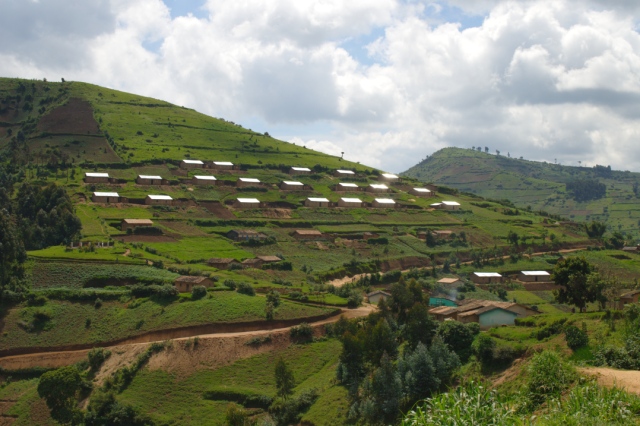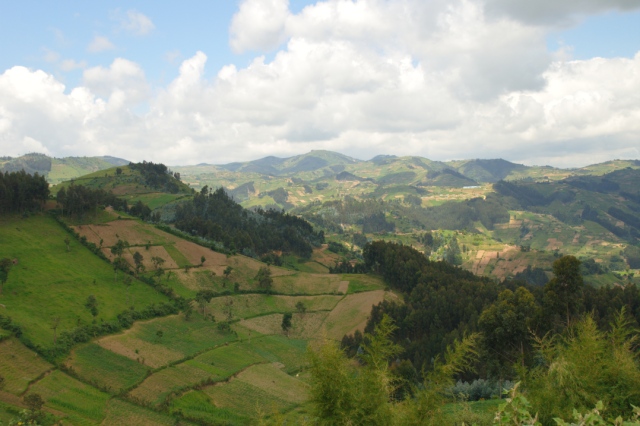
These new homes shelter untold stories. It's a pity I couldn't tell them.
I didn't have time to get permission. I had dinner plans in Kigali. It was 1:30 p.m., and I had meant to leave at noon. The race was on.
I had walked the last 15 kilometres, but I didn't have time to return that way. The villagers, who swarmed me but withheld interviews, called up a motorcycle taxi from Gakeri, the nearest village with minibus service. I chatted and snapped some photographs while I waited.
The motorcycle came and I hopped on, and with an imaginary "hi-ho silver!" I was zipped downhill. The driver told me he knew all the issues here, too, and he speaks four languages so can help with translation if I ever want to come back.

Race or not, I had to dismount to snap a shot.
I told the driver of my haste and with a friendly "no problem," he promised I'd catch a minibus soon. But when we got to Gakeri and I dismounted, he asked around and discovered a minibus had only just left.
It was 2:00 p.m. and it would be a while before another minibus came.
He told me to get back on, and I, bemused with nothing to lose, did.
"Sit closer," he warned.
The motorcycle transformed into a rocket and we bounced down the dirt road as quickly as a small avalanche, beeping but never slowing for amazed passers-by. Ten minutes later, we caught up with the minibus and, with a wave of the driver's hands and honks of his horn, stopped it.
There was still room! I climbed in and willed the road to be less bumpy. The obstinate road would hear none of it, and we plodded downhill for hours.
A girl behind me asked me if I could help her enter Canada.
Soon, at another village, an old man and a teenager joined the rest of us passengers. Then the all-too-familiar conversation started, in Kinyarwanda:
"It's a white person!"
"What's he doing here?"
"I think he doesn't understand Kinyarwanda."
(I don't, for the most part, but I gave a knowing smile anyway.)
"He does know Kinyarwanda!"
"Do you know Kinyarwanda?"
"I'm learning Kinyarwanda," I answered. Switching languages, I continued: "but I know Swahili."
"He understands Swahili!"
The old man fell asleep, and the teenager quite confidently borrowed his radio. It was as long as the kid's forearm and expertly wrapped in white tarpaulin recycled from a bag of charcoal, slitted along the side for access to the dials and fastened in the front by a big, white button reading, "BASIC CONTACT."
He switched it on and fiddled with dials, and a Tanzanian song enlivened the minibus.
I'm looking for a beautiful woman...
"Hey, I know this song! It's from Tanzania," I said.
The bus laughed and agreed. "Yes, it's in Swahili."
The kid discovered the antenna and extended it. Static was triumphing over music until the kid stuck the antenna in his mouth and the singer's voice became clear again.
I went to Morocco (in Dar es Salaam), there weren't any...
"I've been to Morocco. This guy certainly wasn't looking very hard," I said.
That got some laughs.
We continued, for hours, plodding our way down the green hills adorned with green tea leaves, green sugarcane, green banana trees, and green weeds. Rocks wore green moss and motorcycle taxi drivers and passengers wore green helmets. The road seemed exhausted from contrast and tried its best to look green, too.
We finally reached Gisenyi, the Rwandan town bordering Democratic Republic of the Congo. And at 4:10 p.m., I jumped out of the minibus and ran to the Belvedere bus ticket counter.
I waited in an illogical and immobile line for ten minutes, only to find that all buses until the 6 p.m. one were booked.
I sprinted to the Virunga Express offices. Their office was more organized, but their buses weren't any more empty; and as I dejectedly purchased my 6:00 p.m. bus ticket, the 4:30 bus I so coveted left for Kigali.
But I said I'd be there for dinner! I began an apologetic text message, then a thought struck me. I'm white, right? I can break the rules!
I hopped on the 5:00 p.m. bus and stood at the front. I located somebody who spoke Swahili and unveiled my plan:
"You are on a 5:00 p.m. bus. I have a 6:00 p.m. ticket to Kigali. I will pay 2,000 Francs (about $4 USD) to anybody willing to swap tickets."
The message was translated and re-broadcast, and the silly white guy at the front of the bus grinned and waved a bus ticket and 2,000-Franc note like an idiot. And at the last minute, somebody agreed.
On the bus home, my editor called to ask how the story went. I told him it was a failure and he gave me a new assignment: to prepare to cover the case of Peter Erlinder, the American lawyer who was arrested in Kigali on Friday for genocide denial. I spent the entire three-hour trip on my phone, texting, emailing and web-surfing to find contacts and learn what I could, until I ran out of airtime.
I disembarked at the hectic Nyabugogo bus stop, escaped attention, bought more phone credit, found a motorcycle taxi and threw my phone at him. He took directions from my hosts and finally, after 8:00 p.m., I arrived.
The meal was great.